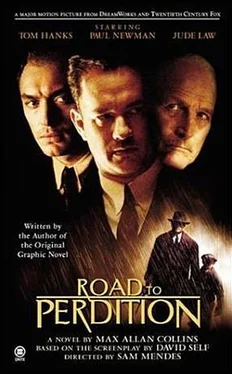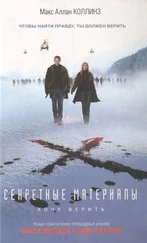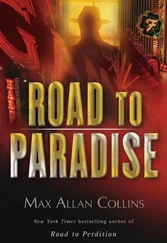“Oh sweet Mary mother... what—”
“I’ve spoken to the boy,” her husband said, cutting her off. “It won’t happen again.”
“But, Mike... ”
He turned to her, his face a stony mask. “No questions, Annie. We won’t speak of this.”
And he left her side, heading to the front closet, for his topcoat and hat.
Outside, Mr. Looney had wandered over to where young Michael was climbing on his bike.
“Just the feller I wanted to see!” the old man said. Then he sidled up to the boy on the bike, and said surreptitiously, “This’ll be our little secret, right?”
Michael pulled back, alarmed. “What do you mean?”
It was almost a shout.
Mr. Looney frowned. “Friendly game of dice, what else could I mean?” He held out a shiny silver dollar. “Here — take it... you won it fair and square. A man of honor always pays his debts.”
Reluctantly, the boy took the dollar.
Mr. Looney stood so close, the grown-up smells smothered the crisp morning air — cigar smoke, liquor, coffee — and made the boy even more uncomfortable.
“And a man of honor always keeps his word,” the old man told the boy, something hard in the ice-blue eyes, something Michael had never seen, or at least noticed, before.
So Mr. Looney knew about last night! Uncle Connor had told him.
“I’m... I’m gonna be late for school,” Michael said, and pedaled off, the old man watching him go — the boy could feel the eyes on his back, burning holes.
When Looney turned, his man O’Sullivan was heading out of the house, shrugging into his topcoat. The wife, Annie, was in the window — she looked concerned. The old man threw her a friendly smile and a wave, as her husband got into the Pierce Arrow, in back. She waved back, but Looney could tell his gesture had done little to assuage her unease.
Within ten minutes, Looney and O’Sullivan were having coffee, seated across from each other in a wooden booth at one of the several restaurants the old man owned in downtown Rock Island. A glorified diner, the place did a brisk business, and was crowded with breakfast trade — of course, a number of the patrons were Looney bodyguards. Several more burly boyos were stationed out on the sidewalk.
Day after a dust-up like last night, the old man knew, extra precautions were called for.
“What an unholy mess,” Looney said. “How’s the boy? He seemed out of sorts to me. Is he okay?”
O’Sullivan seemed happy — or was it relieved? — to hear these words. He said, “I’ve spoken to him. He understands. He’ll keep his pledge to me.”
Nodding, Looney said, “Jesus jumping Christ, it’s tough, seeing that kind of thing for the first time... such a tender age.”
O’Sullivan paused — probably thinking about his first exposure to such like, Looney knew — and then said, “He’s my son.”
“Well,” the old man said, and he bestowed a smile of warmth upon his loyal lieutenant, “you didn’t turn out so bad, did you, lad?”
O’Sullivan didn’t smile, however; his eyes had a haunted quality that disturbed Looney. “I shouldn’t have let it happen.”
“Boys will be boys — which of us didn’t play stowaway as a whelp?... Anyway, you can’t protect children forever. If it hadn’t been one thing, it would have been the other.”
O’Sullivan said nothing.
Looney waved at a waitress for the check, saying, “I fear it’s natural law, my boy — sons are put on this earth to trouble their fathers.”
O’Sullivan smiled, and Looney felt relief: the boy still loved him.
And now the waitress set the check in front of Looney, marked boldly NO CHARGE.
“Ha,” Looney said, “I’ve been coming here forty years, and they never let me pay the check, yet.”
O’Sullivan shrugged, sipped his coffee. “Well, you’re the boss.”
Looney laughed in agreement; but deep down the old man knew that even the boss, eventually, would have to pay.
As a younger man, John Looney’s first ambition was to be an actor, and in Rock Island, in the late 1880’s — when as a telegrapher he was working for Western Union — Looney organized a dramatics club that performed at the Harper Theater on 16th Street and Second Avenue .
When my father was working for Looney, I never knew the old man was an attorney. But in fact John Looney did study law, on his own and without formal schooling, and was admitted to the Illinois bar. Soon the amateur actor turned fledgling attorney began to make powerful associates in the world of business and politics. Nothing criminal, nothing shady, had yet emerged in the life of this ambitious young man, who ran as a Democrat for the state legislature .
But when he lost that election, an embittered Looney began to establish his own form of government. With his law partner, Frank Kelly, he defrauded the city over the construction of storm drains at the century’s turn; and he began his scurrilous newspaper, the News , in 1905, proclaiming the publication would stand for “Truth, Good Government, and the Protection of the People.”
And, over the next decades, he assembled a criminal organization that gathered (in the words of one scholar) “enormous tribute from any and all activities that were in conflict with the laws of the time.”
With or without politics, sanctioned by society or not, John Looney would rule from his roost on the bluff .
Michael O’Sullivan, Sr., stood in the shadows. John Looney, seated at the head of a long table, had his back to O’Sullivan, who had a good view of most everyone else at this meeting of the Looney version of a board of directors. The confab was taking place in the Grand Parlor of the mansion, a room filled not long ago with partying mourners, only a few of whom were included in this esteemed company, the chief of police a prime example. Another was a snappily dressed Connor Looney, seated at his father’s left hand.
The gathering included delegates of the various arms of the Looney empire — eight men representing distilleries, casinos, brothels, loan-sharking, extortion. This had been a working supper — coffee, drinks, the remainder of meals on plates, were in as much evidence as papers and file folders — and was now winding down, as night worked its way in the windows.
Jimmy and Sean, two of Looney’s prime bruiser bodyguards, were on the door; but the great man’s back could only be trusted to Mike O’Sullivan. The Looney family’s chief enforcer did not like to think of himself as a glorified bodyguard, but in some respects, on some occasions, he was that very thing. Most of the men at this table had taken individual meetings, throughout the day, with John Looney; and, after last night’s warehouse debacle, O’Sullivan had been primed and ready for retaliation.
Nothing, so far, from the McGovern forces; and many of the meetings, today, had been designed to unruffle feathers and smooth the way for a nonviolent transition. But the empty chair at the table — Fin McGovern’s seat, which no one had dare take — provided an eloquent wordless reminder of the damage that had been done.
Speaking at the moment was Frank Kelly — in his fifties, the fleshily prosperous-looking partner in Looney’s law firm. “I’d like to take this opportunity to thank our friend Alexander Rance for interrupting a busy travel schedule to make room for us on his dance card.”
Kelly gestured across the table to Rance, a fussy little man in his forties, his clothes well tailored, his grooming immaculate; the man had already made a to-do about having to have a whole slice of lemon in his tea. Rance, in the company of Kelly, had met with Looney this afternoon, a meeting surprisingly short for such an important man to have rearranged his schedule to accommodate it.
Читать дальше












